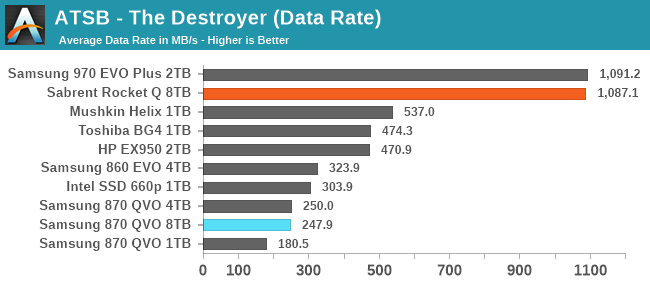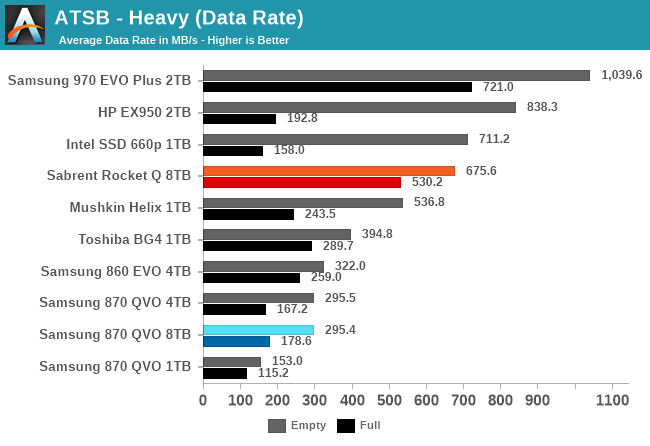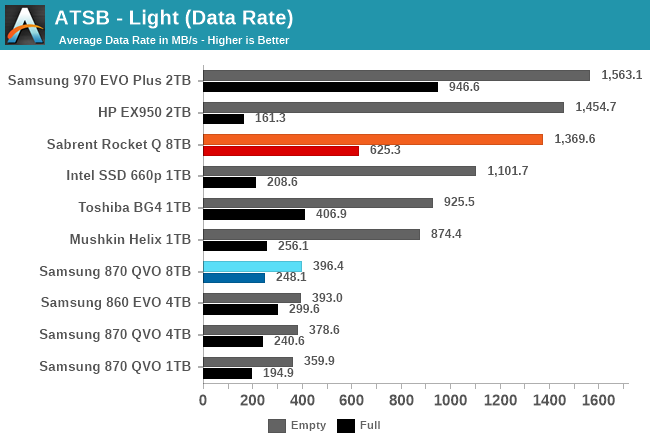QLC Goes To 8TB: Samsung 870 QVO and Sabrent Rocket Q 8TB SSDs Reviewed
by Billy Tallis on December 4, 2020 8:00 AM ESTAnandTech Storage Bench - The Destroyer
The Destroyer is an extremely long test replicating the access patterns of very IO-intensive desktop usage. A detailed breakdown can be found in this article. Like real-world usage, the drives do get the occasional break that allows for some background garbage collection and flushing caches, but those idle times are limited to 25ms so that it doesn't take all week to run the test. These AnandTech Storage Bench (ATSB) tests do not involve running the actual applications that generated the workloads, so the scores are relatively insensitive to changes in CPU performance and RAM from our new testbed, but the jump to a newer version of Windows and the newer storage drivers can have an impact.
We quantify performance on this test by reporting the drive's average data throughput, the average latency of the I/O operations, and the total energy used by the drive over the course of the test.
 |
|||||||||
| Average Data Rate | |||||||||
| Average Latency | Average Read Latency | Average Write Latency | |||||||
| 99th Percentile Latency | 99th Percentile Read Latency | 99th Percentile Write Latency | |||||||
| Energy Usage | |||||||||
The Sabrent Rocket Q turns in shockingly good scores on The Destroyer, matching the Samsung 970 EVO Plus, a high-end TLC SSD. The reason why the decidedly less high-end Rocket Q can do this is due entirely to the extreme capacity. For the first time, we have a drive that can handle The Destroyer entirely in its SLC cache. That means the results here are a bit misleading, as the drive would not be able to sustain this level of performance if it was full enough to reduce the SLC cache capacity down to more typical sizes. Power efficiency is also pretty decent here, but again operating out of the SLC cache helps.
Meanwhile, the 8TB Samsung 870 QVO turns in pretty much the same performance scores as the 4TB model, as expected. However, the 8TB drive is a little bit more power-hungry due to the higher part count.
AnandTech Storage Bench - Heavy
Our Heavy storage benchmark is proportionally more write-heavy than The Destroyer, but much shorter overall. The total writes in the Heavy test aren't enough to fill the drive, so performance never drops down to steady state. This test is far more representative of a power user's day to day usage, and is heavily influenced by the drive's peak performance. The Heavy workload test details can be found here. This test is run twice, once on a freshly erased drive and once after filling the drive with sequential writes.
 |
|||||||||
| Average Data Rate | |||||||||
| Average Latency | Average Read Latency | Average Write Latency | |||||||
| 99th Percentile Latency | 99th Percentile Read Latency | 99th Percentile Write Latency | |||||||
| Energy Usage | |||||||||
The Heavy test doesn't allow the Sabrent Rocket Q a unique advantage from its massive SLC cache; the smaller high-end NVMe drives can also make good use of their caches and overtake the Rocket Q's performance. However, it does appear that the sheer capacity of the 8TB Rocket Q continues to help significantly on the full-drive test runs. We haven't measured it directly, but I suspect the minimum SLC cache size reached when the drive is full is still quite a bit larger than what the 2TB and smaller drives have to work with, and that's how the Rocket Q avoids the horrible latency spikes that the other QLC drives suffer from.
As on The Destroyer, the 8TB Samsung 870 QVO shows no major differences in performance or efficiency from the 4TB model, which means it's still clearly a bit on the slow side even by SATA standards—especially when full.
AnandTech Storage Bench - Light
Our Light storage test has relatively more sequential accesses and lower queue depths than The Destroyer or the Heavy test, and it's by far the shortest test overall. It's based largely on applications that aren't highly dependent on storage performance, so this is a test more of application launch times and file load times. This test can be seen as the sum of all the little delays in daily usage, but with the idle times trimmed to 25ms it takes less than half an hour to run. Details of the Light test can be found here. As with the ATSB Heavy test, this test is run with the drive both freshly erased and empty, and after filling the drive with sequential writes.
 |
|||||||||
| Average Data Rate | |||||||||
| Average Latency | Average Read Latency | Average Write Latency | |||||||
| 99th Percentile Latency | 99th Percentile Read Latency | 99th Percentile Write Latency | |||||||
| Energy Usage | |||||||||
The 8TB Sabrent Rocket Q offers decent performance on the Light test, even when full: it still provides a large enough SLC cache to handle all the writes from this test. A lot of smaller drives (using QLC or TLC) can't manage that and show greatly increased write latency on the full-drive test runs.
The 8TB Samsung 870 QVO shows slightly improved latency scores on the full-drive test run compared to the 4TB model, but otherwise performance is the same as expected. As usual, the 8TB QVO is a bit more power-hungry than the smaller versions, and the Rocket Q is considerably more power-hungry than the smaller low-end NVMe drives.










150 Comments
View All Comments
shabby - Friday, December 4, 2020 - link
Go home qlc ssd manufacturers, you're drunk!Oxford Guy - Friday, December 4, 2020 - link
The market doesn't care what we want. It's driven by the manufacturers. That's the way most of tech is because of duopoly, triopoly power and the high cost of owning fabs. They get to dictate to us which is not the way consumerist capitalism is supposed to work.Oxford Guy - Friday, December 4, 2020 - link
There is also consumer ignorance. Go to a site that pushes product, like slickdeals, and you won't find the type of NAND listed in the listing for their SSD "deals". Everything is just an "SSD". Manufacturers are counting on consumer ignorance.Zim - Saturday, December 5, 2020 - link
Not true. Every one of those deals has people saying no to QLC. People still buy it because it's cheap.SirDragonClaw - Saturday, December 5, 2020 - link
Not true. 99.9% of people wouldn't even know what QLC means.ahtoh - Sunday, December 6, 2020 - link
Not true. I'd say 50% at least. People who buy SSDs (or parts in general) are more educated and probably know what they're doing.s.yu - Sunday, December 6, 2020 - link
"Parts"Ah that actually makes it sound pretty sophisticated :)
at_clucks - Monday, December 7, 2020 - link
50% of people know what QLC means? Is that a joke? 50% of ATers don't understand what that means. Most consumers who even heard of the term think it's just another type of LC, the more LCs the better right? No, almost no consumer knows what that means, it's a tech spec, they may know it's not the best out there but that's it But if the price is good they won't care.Product listings are marketing fluff and BS sprinkled with plenty of concepts no regular user will even understand because they sound fancy (like TWD and ECC), they will list stuff that the average consumer can understand and relate to - capacity, speed (lots of megabytes per second, thousands of them, eye catchy), and maybe the interface because they have to (again, in an eye catching way like "SATA 6.0 Gb/s"). Even if there is a Q in the product model almost nobody cares about that.
Search for QVO on Amazon and you'll see stuff like "RELIABLE AND SUSTAINABLE: The capacity of the 8TB 870 QVO increases reliability up to 2,880 TBW using a refined ECC algorithm for stable performance".
DigitalFreak - Monday, December 7, 2020 - link
Market these "Q"LC drives to Trump supporters and watch them fly off the shelves.peevee - Wednesday, December 9, 2020 - link
Oh, you gamer kidding are so smart and sophisticated, you even know the sacred secret of what QLC means! Do you know what 2+2 is? Then you deserve the Fields medal!We, engineers with decades of experience engineering this world, who thought that exactly 0 consumer applications and not more than 1% of enterprise applications require sustained write speeds over 300MB/s, bow before you!
Don't forget to ask for extra tip next time you serve me coffee.